|
By E.S. Almost anyone’s list of “People Who Have Influenced My Life” includes at least one teacher. What kind of teachers are these?-The kind who use their talents to help develop others’ talents; the kind who strive to shape not just the mind but the heart. For me, it was a teacher we students came to affectionately call Auntie Marina. Auntie Marina was level-headed and stricter than most of our other teachers and caretakers, firm in her sense of right and wrong, and at first we kids grumbled about that. Before long, however, we learned to trust her because we sensed that she cared about what kind of people we would become. We felt secure with Auntie Marina because she clearly defined our boundaries. While Auntie Marina set limits and enforced the rules, she demonstrated equal amounts of positiveness and love, and she also had an appropriate sense of fun. School with her wasn’t limited to worksheets and textbooks. She took us on excursions and trips to the park, and shared her artistic talent in order to get us interested in arts and crafts. She also had a knack for making each of us feel special, and one way she did this was by speaking positively about us to others when we were within earshot. I can still recall the pride I felt upon overhearing her tell another teacher how well I was doing in spelling. It was satisfying to know that my efforts had not gone unnoticed. Auntie Marina’s care and love extended beyond the school years. For quite some time after our family moved to Taiwan, she sent me notes and cards. Ten years later, I still have several of them. When I reread one of those notes recently, I marveled at the concern and interest she had shown in corresponding with an eight-year-old: “Yesterday I came across your picture as I was preparing a photo album of ‘the children in my life’-those I’ve cared for and taught over the years-and I was reminded of how much I love you, my dear young friend.” On my ninth birthday she wrote: “A very happy birthday to you. I pray that it will be a wonderful, special day for you, and a great new year of your life, full of good surprises and love-filled experiences. I’m happy to know you!” On June 9, 2005, after a prolonged struggle with cancer, Auntie Marina passed away. I know I am only one of many who are better for having experienced her love, which she always reminded us was God’s love poured through her. Courtesy of Activated magazine.
0 Comments
By Jessica Roberts It’s the end of a long day of caring for sick children. No, not my own. They belong to a couple whose job often calls them away to tend to others’ needs at the sacrifice of some of their time together as a family. I am the children’s teacher, and I usually enjoy being a substitute parent, but not this week. “I’m feeling overtired, run down, and stressed,” I grumble. “I’m way behind on the dishes and laundry, and I’m missing a beach trip with my friends to instead take care of a bunch of coughing, sniffling, whiny kids. The kids are having their midday nap, and my day still stretches before me. I haven’t had enough sleep or fresh air for days now. I’m not meant do this. I’m not their mother. Mothers have the patience, the selflessness, the unconditional love for their children to put up with all this! Not me. These kids are driving me crazy!” A creak on the stairs tells me somebody’s awake. It’s two-year-old Susy. “What do you need, Susana?” She pauses for half a second, then runs to me, throws her little arms around my neck, and whispers, “I love you!” Then she turns and runs back to bed. I hear four-year-old Martin stirring, so I go to check on him. He opens one eye and mumbles sleepily, “You’re the bestest teacher ever!” Something about the way he smiles when he says that… I think about their pure-hearted love and how they’ve adopted me. I remember all the laughs, the hugs, the discoveries we’ve shared. Suddenly I’m not so tired anymore. I remember what Jesus said about loving the little people, “Inasmuch as you did it to one of the least of these My brethren, you did it to Me” (Matthew 25:40). We’re going to have our best day yet! I’m sure there is a way to build a three-ring circus in the sick room. And when they reach that tired, grumpy hour before dinner, I’ll just shoot up a prayer and ask for some of the Lord’s unconditional love. And I’ll thank God for the blessing of having these kids to care for. © The Family International
By Tomoko Matsuoka I wouldn’t have used this color in the wildest color scheme-a garish yellow that takes on a greenish tint when the light strikes it just right. But here it is, in sharp contrast to the muted red cover of my diary, a child’s shiny yellow rose sticker. Of all of the gifts I have ever received, I have treasured this one more than most. Thinking back, I can’t remember what my little sister had said that had gotten me in such a tizzy. All I remember is that she had been complaining, and I had lectured her severely. I hadn’t gone so far as enumerating every woe that the least fortunate child in the world might be experiencing at that very moment, but I had come close. After demanding an apology, I turned back to my book. A few quiet moments had passed when I heard rustling. I refused to look up. I wanted my little sister to feel the full effect of my righteous exasperation. Let her stew, I thought. The rustling continued. I willed myself to stay put, but I couldn’t help wondering what was absorbing her so completely. Another few moments passed, and then the patter of footsteps came up behind me. They stopped. Silence. I refused to look up from my book, but from the corner of my eye I caught a glimpse of her hand pushing an envelope onto the desk next to me. She turned and ran from the room. Curious, I flipped open the envelope. Something impossibly yellow tumbled onto my lap. It was a rose sticker. I flipped it over, and there in a five-year-old’s handwriting were the words, “I’m sorry. I love you.” In a preschooler’s barter economy, stickers are precious. And this was no ordinary sticker. Considering that to a child’s way of thinking, bigger is better, the brighter the better, and shiny is best of all, this big shiny rose sticker that had fallen into my lap had undoubtedly been the prize of her collection. I sat stunned for a moment at her boundless ability to love me despite my ornery self-centeredness. I found her, hugged her, and told her I was sorry. © The Family International. By Jane Lampman, The Christian Science Monitor, Januray 28, 1999 Little Earl and his mom and dad were having a terrible time. Diagnosed as hyperactive and defiant at school and at home, the redheaded seven-year-old with a sprinkle of freckles couldn’t seem to control his anger. One tumultuous week it got so bad he was hospitalized for the weekend. Six months later, Earl was much happier: He had found a new way to deal with his feelings, his parents’ relationship with each other had improved, and he no longer needed the Ritalin or Prozac he was being given for hyperactivity. He began to do well in school. Both he and his parents had found a “third way” to deal with their anger. Rather than denying or venting it, they had learned how to forgive. And their answer is one that is being explored much more widely today. “Forgiveness has remarkable healing power in the lives of those who utilize it,” says Richard Fitzgibbons, the Philadelphia psychiatrist who worked with Earl and is one of the pioneers in introducing forgiveness into the mental health field. Forgiveness is a “hot topic” now in many areas, from academic research to marital and family counseling to politics and community life. “Forgiveness is now being rediscovered as a creative human faculty for overcoming estrangement,” says Lewis Smedes, professor emeritus of theology and ethics at Fuller Theological Seminary in Pasadena, Calif., in Dimensions of Forgiveness(Templeton Foundation Press, 1998). “Forgiveness is more than a moral imperative, more than a theological dictum. It is the only means, given our humanness and imperfections, to overcome hate and condemnation and proceed with the business of growing and loving,” says Paul Coleman, a psychologist in Wappinger Falls, N.Y. Forgiveness has “a spiritual component,” Dr. Coleman says, “a grace from God, if you will,” and spirituality has only become a little more accepted in the mental health field in the last decade. Dr. Worthington, author of To Forgive Is Human, says the key ingredient is empathy. “The degree to which a person can empathize is related strongly to the degree they can forgive.” Given what is happening in the world, he adds, forgiveness “has the potential to be enormously influential” in the 21st century. Research will also soon show, he says, that it will be very healthy not just to forgive an event or a person but to have a forgiving character. Forgiveness: Free Stories and Videos for Children Stories:
Videos: Image courtesy of David Castillo Dominici/FreeDigitalPhotos.net
By Akio Matsuoka “I’ve been so busy with life that I haven’t had time to think,” a terminally ill woman in her forties told me when I visited her at a hospice. “I realized while lying here that I barely know my husband, my children, or my mother-in-law, who also lives with us. I’ve been wrapped up in caring for them—shopping and cooking, doing their laundry, cleaning after them, helping them with their homework—and yet I can’t say that I really know what they are thinking or what they are going through. I can’t tell you when was the last time that I had a deep conversation with any of them.” I heard a similar lament recently while attending a seminar. The main lecturer finished and opened the floor for a casual question-and-answer period. An elderly man who was the retired CEO of a large company stood up and spoke to the 100 or so attendees. “I am 70 years old, currently in excellent health, and recently retired with a substantial pension. I was looking forward to finally relaxing and spending time with my family, but yesterday my wife asked for a divorce. I have worked hard my entire life, always for the family that I loved. Where did I go wrong? Why has my life turned out this way?” I often hear people say that they want their loved ones to be happy, and that is why they need to work so long and hard. Unfortunately, the more successful they become, the busier they get and the less time they have to spend with their families—and the less they reap of the rewards they expected from their investment. While the dying woman’s and the retired man’s motives may have seemed noble at the time, the lives they led to hadn’t been able to satisfy the needs of their loved ones’ hearts. The Bible tells us, “Don’t forget to do good and to share with those in need. These are the sacrifices that please God.”1 The original Greek word translated “share” is koinónia, which means “participation,” “communion,” “fellowship.”2 Sacrifice other things to make time to help others, to participate in their lives, to share in their victories and struggles, to have heart-to-heart interaction with them—in short, make time to love. Akio Matsuoka has been a missionary and volunteer worker for the past 35 years, both in his native Japan and abroad. He lives in Tokyo. 1. Hebrews 13:16 NLT 2. Strong’s Concordance Article originally published in Activated magazine. Used with permission.
When I was growing up, I knew a family of six brothers and sisters. I was impressed by them because they were so unconcerned about being part of the “in group” or wearing the latest style; to me they seemed secure and unafraid of failure. Each of the six had his or her own personality, but all possessed one similar quality, a quality that I grew to greatly admire. It was a certain peace, a security or naturalness—in short, it was confidence. This confidence wasn’t from individual brilliance, athletic ability, or good looks—they were actually pretty average in each of those categories-so I was interested in where it came from. One day an unexpected opportunity came to discover the true source of their confidence. The family moved into a house just across the block from ours. Now, instead of only seeing them at school, I saw them in my neighborhood, and the secret was revealed! Within their home, acceptance and trust were generously shared between parents and children, and that inspired confidence in each person. It’s no wonder that confidence would spring from a trusting and accepting environment. Interestingly, the root word of confidence is confide. In order to confide in someone, there has to be trust. When two people share a mutual trust and acceptance of each other, the result is confidence—confidence in the other person and confidence in oneself. — Deepa Daniels The ultimate safety net Many children simply need a firm footing of love and acceptance by their parents. This foundation of love provides a cushion of protection and security around them that will help keep them from danger and bad influences, such as drugs or alcohol, or even the pain of rejection by their friends. Your love and acceptance will provide a safety net of protection at such times. If they know that you will not reject them, even for their mistakes or foolish actions, they will come to you and there will be the bond that you desire. Children need to know that you will always love them no matter what they do, that nothing will ever take your love away. They must know that they can always talk to you; that even though you may not agree, you may not see eye to eye, you may even think that they’ve done something that is very wrong or harmful, still you are always their parent. You will always love them and they can always come to you. Even if all hell would break loose, your child would know that they will always have your love. — “Parenteening”, by Derek and Michelle Brooks. - "This is the Confidence" excerpted from http://just1thing.com/podcast/2011/6/15/this-is-the-confidence.html
- "Parenteening" © Aurora Productions. By Peggy Porter
My son Gilbert was eight years old and had been in Cub Scouts only a short time. During one of his meetings he was handed a sheet of paper, a block of wood, and four tires, and told to return home and give it all to “Dad.” That was not an easy task for Gilbert to do. Dad was not receptive to doing things with his son. But Gilbert tried. Dad read the paper and scoffed at the idea of making a pinewood derby car with his young, eager son. The block of wood remained untouched as the weeks passed. Finally, Mom (me) stepped in to see if she could figure this all out. The project began. Having no carpentry skills, I decided it would be best if I simply read the directions and let Gilbert do the work. And he did. Within days his block of wood was turning into a pinewood derby car. A little lopsided, but looking great (at least through the eyes of Mom). Gilbert had not seen any of the other kids’ cars and was feeling pretty proud of his “Blue Lightning”—the pride that comes with knowing you did something on your own. Then the big night came. With his blue pinewood derby in his hand and pride in his heart we headed to the big race. Once there, my little one’s pride turned to humility. Gilbert’s car was obviously the only car made entirely on his own. All the other cars were a father-son partnership, with cool paint jobs and sleek body styles made for speed. A few of the boys giggled as they looked at Gilbert’s lopsided, wobbly, unattractive vehicle. To add to the humility, Gilbert was the only boy without a man at his side. A couple of the boys who were from single-parent homes at least had an uncle or grandfather by their side. Gilbert had only Mom. The race was done in elimination fashion. You kept racing as long as you were the winner. One by one the cars raced down the finely sanded ramp. Finally it was between Gilbert and the sleekest, fastest-looking car there. As the last race was about to begin, my wide-eyed, shy eight-year-old asked if they could stop the race for a minute because he wanted to pray. The race stopped. Gilbert hit the ground on his knees, clutching his funny-looking block of wood between his hands. With a wrinkled brow, he conversed with God. He prayed in earnest for a very long minute and a half. Then he stood with a smile on his face and announced, Okay, I am ready.” As the crowd cheered, a boy named Tommy stood with his father as their car sped down the ramp. Gilbert stood with his Father within his heart and watched his block of wood wobble down the ramp with surprising speed. It rushed over the finish line a fraction of a second before Tommy’s car. Gilbert leaped into the air with a loud “Thank You!” as the crowd roared in approval. The Scout Master came up to Gilbert, microphone in hand, and asked the obvious question, “So you prayed to win, huh, Gilbert?” My young son answered, “Oh, no sir. That wouldn’t be fair—to ask God to help you beat someone else. I just asked Him to make it so I don’t cry when I lose.” Yes, Gilbert walked away a winner that night, with his Father at his side. By Angela Koltes
On a dreary and overcast winter day, I set out with a few friends to spend the afternoon at the nearby school for the blind. It was one of those “any old Sundays” where I was exhausted from the week’s busy schedule and longed for the comfort of my warm bed and the welcoming idea of lounging at home. I had no desire to go outside; after all, almost everyone would be spending time on themselves and taking the day off. But because we had promised to go by the school to give the children a little cheer and fun on a lonely Sunday afternoon, we were obligated to go. On weekends, most of the families of students came to pick up their children, as the blind children boarded at the school during the week. So there were few kids this Sunday, yet each one of them showed their delight at our coming, welcoming us with joyful expressions. We didn’t have much of a plan, but we brought a guitar, shakers, and bongos, hoping to bring some happiness into their seemingly colorless worlds. The children crowded around us, listening to the music and trying to understand where we came from and what we looked like. Some of them had their own instruments, as most of them are musically talented, and they played along, enthusiastically showing us what they knew. In the midst of all the noise and activity I noticed one little short-haired girl sitting shyly away from the other children. I wondered who her parents were and why they hadn’t come to visit such a beautiful little girl. I felt angry, wondering how this child could deserve to be deprived of her sight and made to live as handicapped. While watching her, the first thing that captured me was her bright and radiant smile. “How could this little blind girl, in her sad condition, be so happy?” I wondered to myself. The teacher, who followed my gaze, began to tell us her story. Seda was seven years old and had been through a brain operation two years before. “I could see the trees, the birds, the doctor’s face, everything.” She added, listening to her teacher, “But after I woke up, I couldn’t see anything anymore.” It was as if a rock fell from a high ledge and landed at the bottom of my heart! I could only continue to watch the little girl in silence. “But I am so happy!” she exclaimed, giggling and playing with her hands. “Why are you happy, Seda?” her teacher asked for us. “Well,” she began softly, “Even though I cannot see on this earth anymore, I will be able to see again in heaven—and I am waiting and looking forward to that day.” My eyes filled with tears, and I knew by looking around that my friends shared the same feeling. The rest of the afternoon Seda stuck near me. She grabbed my hand and led me around the school. She sat on my lap and talked about all the food she liked to eat, each vegetable and fruit she enjoyed and why. She found such delight in the tastes and sounds around her, it was as if she had forgotten she could not use her sense of sight. When I drove home that evening, Seda’s face stuck in my mind. What did this girl see in her black world that made her so happy? Later, when I would feel the strain of a difficult workday, whatever I might be going through at the moment, when I thought of Seda, I knew I couldn't complain. Sometimes the dark days we are forced to pass through seem unbearable and we see no shining rays of dawn. We struggle each day while despising what we see around us. Yet I know if I can only strive to think as that little angel did, whose sight had been taken from her, and look toward heaven as she did, I can praise for each day I have been given on this earth. Whenever I am tempted to curse the darkness and criticize what I see around me, that little girl’s smile comes to mind. I think of her faith and I think of the eyes that were given to her to see the daylight of tomorrow, and I know if she can, I surely can too. Parenting magazine
Myth: Dairy products make a child’s cold worse. Reality: It’s just not true that dairy products increase mucus production or thicken nasal secretions. The cold virus itself causes mucus production in the nose and the back of the throat. Dairy products simply coat the lining of the back of the throat, making it feel funny. You can continue to offer your child milk or other dairy products when she’s sick with a cold. If she won’t drink milk, don’t worry. Simply give her other liquids—water, juice, or chicken soup—until she feels better. Even if she doesn’t have much of an appetite, it’s important that she gets plenty to drink to ward off dehydration and keep mucus flowing through her nasal passages. Myth: You must be vigilant when introducing foods into a child’s diet, because many kids have food allergies. Reality: Food allergies aren’t nearly as common as people believe. Almost one in three parents thinks her child has food allergies, but only 6-8% of kids really do. Food allergies occur when the immune system attacks the otherwise harmless food and causes a reaction such as hives, eczema, vomiting, diarrhea, etc. And though parents frequently blame such reactions on a long list of edibles, the reality is that milk, eggs, peanuts, tree nuts (such as cashews and walnuts), wheat, soy, fish, and shellfish account for 90% of food allergies. If you suspect that your child has an allergy, discuss the likely offender with your pediatrician. Myth: Milk is essential for strong bones. Reality: Milk is one of the best sources of calcium, but if your child won’t drink it, she can still get adequate amounts of the bone builder from other foods. These include yogurt, cheese, calcium-fortified soymilk, broccoli, tofu, dark, leafy greens, and calcium-fortified, 100% juice (such as orange). What matters most is that your child meets the recommended daily intake: 500 milligrams of calcium a day for kids ages one to three; 800 milligrams for four- to six-year-olds; and 1,300 milligrams for kids nine and older. Myth: When your child’s sick, it’s best to feed a cold and starve a fever. Reality: You should never withhold food from a child, doctors say. Your child needs all the nutrients and fluids he can get to fight an infection. But if he isn’t up to eating full meals, don’t worry. Sick kids should be allowed to eat what they feel like and listen to their bodies. It’s more important for them to drink plenty of liquid to prevent dehydration. They’ll make up calories pretty quickly once they’re feeling better. Myth: Juice is a healthy thirst quencher. Reality: Though 100% juice is definitely more nutritious than sugary drinks, it shouldn’t be the only drink your child reaches for when she’s thirsty. There have to be limits on a child’s juice intake. Otherwise, it will decrease her appetite for more nutritious foods and may displace milk as a beverage. What’s more, because of the high natural sugar content of juice, drinking an excessive amount can harm teeth or cause stomach upset in babies. Nutritionists recommend limiting a toddler’s juice consumption to about four to six ounces a day; older kids should try not to drink more than 12 ounces a day. Offer juice as a treat, not a thirst quencher. Water is a better choice when your child is thirsty. |
Categories
All
Archives
March 2024
LinksFree Children's Stories |










 RSS Feed
RSS Feed
